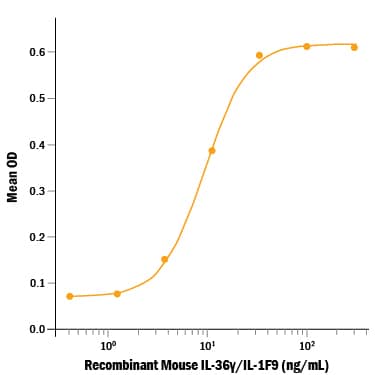Recombinant Mouse IL-36 gamma/IL-1F9 (aa 13-164) Protein
R&D Systems, part of Bio-Techne | Catalog # 6996-IL

Key Product Details
Source
Accession #
Structure / Form
Conjugate
Applications
Product Specifications
Source
Gly13-Ser164
Purity
Endotoxin Level
N-terminal Sequence Analysis
Predicted Molecular Mass
SDS-PAGE
Activity
The ED50 for this effect is 3-18 ng/mL.
Reviewed Applications
Read 1 review rated 4 using 6996-IL in the following applications:
Scientific Data Images for Recombinant Mouse IL-36 gamma/IL-1F9 (aa 13-164) Protein
Recombinant Mouse IL-36 gamma/IL-1F9 (aa 13-164) Protein Bioactivity
Recombinant Mouse IL-36 gamma/IL-1F9 (aa 13-164) (Catalog # 6996-IL) induces IL-6 secretion in the NIH‑3T3 mouse embryonic fibroblast cell line. The ED50 for this effect is 3-18 ng/mL.Recombinant Mouse IL-36 gamma/IL-1F9 (aa 13-164) Protein SDS-PAGE
1 µg/lane of Recombinant Mouse IL-36 gamma/IL-1F9 (aa 13-164) was resolved with SDS-PAGE under reducing (R) conditions and visualized by silver staining, showing a single band at 17 kDa.Formulation, Preparation and Storage
Carrier Free
What does CF mean?CF stands for Carrier Free (CF). We typically add Bovine Serum Albumin (BSA) as a carrier protein to our recombinant proteins. Adding a carrier protein enhances protein stability, increases shelf-life, and allows the recombinant protein to be stored at a more dilute concentration. The carrier free version does not contain BSA.
What formulation is right for me?In general, we advise purchasing the recombinant protein with BSA for use in cell or tissue culture, or as an ELISA standard. In contrast, the carrier free protein is recommended for applications, in which the presence of BSA could interfere.
Carrier: 6996-IL
| Formulation | Lyophilized from a 0.2 μm filtered solution in MES, NaCl, TCEP, EDTA, CHAPS and PEG 8000 with BSA as a carrier protein. |
| Reconstitution | Reconstitute at 100 μg/mL in PBS containing at least 0.1% human or bovine serum albumin. |
| Shipping | The product is shipped with polar packs. Upon receipt, store it immediately at the temperature recommended below. |
| Stability & Storage | Use a manual defrost freezer and avoid repeated freeze-thaw cycles.
|
Carrier Free: 6996-IL/CF
| Formulation | Lyophilized from a 0.2 μm filtered solution in MES, NaCl, TCEP, EDTA, CHAPS and PEG 8000 with Trehalose. |
| Reconstitution | Reconstitute at 100 μg/mL in PBS. |
| Shipping | The product is shipped at ambient temperature. Upon receipt, store it immediately at the temperature recommended below. |
| Stability & Storage | Use a manual defrost freezer and avoid repeated freeze-thaw cycles.
|
Background: IL-36 gamma/IL-1F9
References
- Kumar, S. et al. (2000) J. Biol. Chem. 275:10308.
- Busfield, S.J. et al. (2000) Genomics 66:213.
- Dunn, E. et al. (2001) Trends Immunol. 22:533.
- Barksby, H.E. et al. (2007) Clin. Exp. Immunol. 149:217.
- Dinarello, C. et al. (2010) Nat. Immunol. 11:973.
- Debets, R. et al. (2001) J. Immunol. 167:1440.
- Chustz, R.T. et al. (2010) Am. J. Respir. Cell Mol. Biol. 45:145.
- NCBI Accession # NP_705731.2.
- Towne, J.E. et al. (2004) J. Biol. Chem. 279:13677.
- Ramadas, R.A. et al. (2011) Am. J. Respir. Cell Mol. Biol. 44:134.
- Johnston, A. et al. (2011) J. Immunol. 186:2613.
- Blumberg, H. et al. (2010) J. Immunol. 185:4354.
Long Name
Alternate Names
Gene Symbol
UniProt
Additional IL-36 gamma/IL-1F9 Products
Product Documents for Recombinant Mouse IL-36 gamma/IL-1F9 (aa 13-164) Protein
Product Specific Notices for Recombinant Mouse IL-36 gamma/IL-1F9 (aa 13-164) Protein
For research use only

